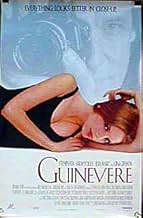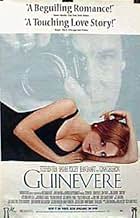NOTE IMDb
5,9/10
2,8 k
MA NOTE
Une jeune fille issue d'une famille aisée se rebelle et se lie avec un photographe beaucoup plus âgé qu'elle.Une jeune fille issue d'une famille aisée se rebelle et se lie avec un photographe beaucoup plus âgé qu'elle.Une jeune fille issue d'une famille aisée se rebelle et se lie avec un photographe beaucoup plus âgé qu'elle.
- Réalisation
- Scénario
- Casting principal
- Récompenses
- 2 victoires et 7 nominations au total
Sharon McNight
- Leslie
- (as Sharon Mcnight)
Avis à la une
Writer/director Audrey Wells, who would go on to make 2003's "Under the Tuscan Sun" as well as the recent "Shall We Dance", directed Sarah Polley in 1999's "Guinevere". Wells' forte seems to be characters in search of romance who find it in unexpected places. It was the 'ugly' girl in "Truth About Cats & Dogs", Italy in "Tuscan Sun", and the older man in this film. That older man is played with wild abandon by Stephen Rea, often inappropriately stealing the show. Ignoring Jean Smart's histrionic heavy scene later in the film, and the control Rea's Connie has over Polley's Harper, this is Sarah Polley's film. What make this film work is its sensitivity and subtly, especially toward Harper's youth, naivete, and uncertainty in love and life. It's a sweet film about self-discovery at any age, and although it gets a bit moody toward the end, it works well as a date movie.
Thoughtfully written, well acted, provocatively true to life... this is a movie for the intelligent, mature audience, not a movie to appeal to the lowest common denominator. Those who are too lazy to think (or just unable to!) won't "get it" and will condemn it because it did not hand them an answer on a platter. Those who thought about the story rather than merely reacting and who dug into the emotions found level after level of story and enjoyed the irony of the fact that even the most intelligent among us frequently do something we may later view as stupid. Even so, those "stupid" things help shape who we are, and may be as important to the formation of who we are as the "correct" choices we also make.
Worth the ticket and worth buying it on DVD when available.
Worth the ticket and worth buying it on DVD when available.
A young woman living in San Francisco, who has just been accepted to Harvard, decides upon another path after meeting and falling under the influence of an older man, an artist, in `Guinevere,' written and directed by Audrey Wells. Sarah Polley stars as Harper Sloane, who lives with her career oriented, rather self-absorbed family-- her parents, Alan (Francis Guinan) and Deborah (Jean Smart), and her older sister, Susan (Emily Procter). Rather self-conscious and unsure of herself, Harper has allowed her parents to plan her future-- a career in law, though it is decidedly against her own wishes. Then at Susan's wedding she meets the photographer, Connie Fitzpatrick (Stephen Rea), an artist, who quickly gains her confidence and lures her into his own bohemian lifestyle. She moves in with him (unbeknownst to her parents, who think she's staying with a friend for awhile), and he becomes her mentor; she is his `Guinevere,' and the only demands he makes of her is that she `create' something every day. The choice of her artistic endeavors is entirely up to her; photography, painting, writing, dancing. but she must create.
Inevitably, of course, their relationship develops beyond the mentor/protege stage, and she learns some things about him that ultimately lead to complications. And she discovers that her reign as Queen Guinevere may not be all that she had expected it to be.
Wells convincingly presents the allurement of a lifestyle free of constraints and overwhelming demands, which makes it quite understandable that the indecisive Harper would choose to go with Connie, rather than adhere to the wishes of her parents, who are rather cold and impersonal and altogether controlling (especially her mother). The fact that Alan dotes on Susan and could seemingly care less about Harper, as well as Deborah's apparent lack of actual concern for Harper, qualifies the facility with which Harper is able to effect her plans so readily. And even when Deborah finds out what Harper is up to (which, of course, was inevitable), she seems to take it as a personal affront more than anything, and is content with merely denigrating the relationship into which her daughter has entered, rather than even trying to change it, which ostensibly at least, would be the appropriate reaction of a concerned parent.
Polley is well cast as Harper, as physically and emotionally she is able to fit Harper's profile perfectly, and she gives a credible performance, though given her unassuming manner and fairly nondescript appearance, it says more about Connie than it does about her. And what you have already been able to deduce about Connie from his pursuit of Harper is further underscored during a scene in which Deborah confronts him with her views on the situation (which is arguably the most powerful scene in the film).
Rea is perfectly cast, as well, affecting a patient, reserved manner, touched with an almost forlorn weariness evocative of a certain wisdom-of-the-world attitude that makes Harper's attraction to him believable. And as the story unfolds, he very subtly allows you to see more of what lies beneath the surface until, in the end, you have a concise picture of who Connie really is. It's a fine, understated performance, and a good bit of work by Rea.
In a supporting role that demands mention, Jean Smart gives a smoldering performance as Deborah, a woman of seemingly insatiable needs and an overwhelming desire to dominate. And Smart plays it perfectly, from the look in her eye to the telling way she carries herself, making the most of her limited screen time and making Deborah the most memorable character of the film.
The supporting cast includes Gina Gershon (Billie), Paul Dooley (Walter), Carrie Preston (Patty), Tracy Letts (Zack), Sharon McNight (Leslie), Sandra Oh (Cindy), Grace Una (April) and Jasmine Guy (Linda). Though not a film with which you can get too emotionally involved, `Guinevere' has it's moments and does manage to maintain interest. The characters are real enough, but they evoke a sense of ambivalence; these are not people you are necessarily going to like or dislike. In the final analysis, it's a good film, and worth seeing-- but with the possible exception of Smart's character, there is nothing especially memorable or compelling about it. I rate this one 6/10.
Inevitably, of course, their relationship develops beyond the mentor/protege stage, and she learns some things about him that ultimately lead to complications. And she discovers that her reign as Queen Guinevere may not be all that she had expected it to be.
Wells convincingly presents the allurement of a lifestyle free of constraints and overwhelming demands, which makes it quite understandable that the indecisive Harper would choose to go with Connie, rather than adhere to the wishes of her parents, who are rather cold and impersonal and altogether controlling (especially her mother). The fact that Alan dotes on Susan and could seemingly care less about Harper, as well as Deborah's apparent lack of actual concern for Harper, qualifies the facility with which Harper is able to effect her plans so readily. And even when Deborah finds out what Harper is up to (which, of course, was inevitable), she seems to take it as a personal affront more than anything, and is content with merely denigrating the relationship into which her daughter has entered, rather than even trying to change it, which ostensibly at least, would be the appropriate reaction of a concerned parent.
Polley is well cast as Harper, as physically and emotionally she is able to fit Harper's profile perfectly, and she gives a credible performance, though given her unassuming manner and fairly nondescript appearance, it says more about Connie than it does about her. And what you have already been able to deduce about Connie from his pursuit of Harper is further underscored during a scene in which Deborah confronts him with her views on the situation (which is arguably the most powerful scene in the film).
Rea is perfectly cast, as well, affecting a patient, reserved manner, touched with an almost forlorn weariness evocative of a certain wisdom-of-the-world attitude that makes Harper's attraction to him believable. And as the story unfolds, he very subtly allows you to see more of what lies beneath the surface until, in the end, you have a concise picture of who Connie really is. It's a fine, understated performance, and a good bit of work by Rea.
In a supporting role that demands mention, Jean Smart gives a smoldering performance as Deborah, a woman of seemingly insatiable needs and an overwhelming desire to dominate. And Smart plays it perfectly, from the look in her eye to the telling way she carries herself, making the most of her limited screen time and making Deborah the most memorable character of the film.
The supporting cast includes Gina Gershon (Billie), Paul Dooley (Walter), Carrie Preston (Patty), Tracy Letts (Zack), Sharon McNight (Leslie), Sandra Oh (Cindy), Grace Una (April) and Jasmine Guy (Linda). Though not a film with which you can get too emotionally involved, `Guinevere' has it's moments and does manage to maintain interest. The characters are real enough, but they evoke a sense of ambivalence; these are not people you are necessarily going to like or dislike. In the final analysis, it's a good film, and worth seeing-- but with the possible exception of Smart's character, there is nothing especially memorable or compelling about it. I rate this one 6/10.
5n8
Technically, Ms. Wells has a superb film here. The cinematography is innovative and germane to the story. The actors all give enjoyable and appropriate performances. The storyline, however, leaves a bit to be desired. I imagine that feminist critics would have a hey-day with this one. I don't buy it. I don't believe the relationships in the film are genuine and honest - it just doesn't work. Ms. Wells explained after the show that she works from a theme and creates her movies that way, and from that perspective, the movie works. If one only looks at the movie for the theme and disregards most other concerns, s/he will love this film. I was disappointed.
Guinevere: Harper Sloane (Sarah Pollack) is a painfully shy young woman trapped in a household of lawyers lorded over by an alpha-mother (Jean Smart) who treats her like a servant. Destined to attend Harvard law school and join the pack, Harper finds her salvation in Connor Fitzgerald (Steven Rea), part-time photographer/philosopher, full-time con-man Svengali. Connor actually listens to what she says and offers her escape into an exciting bohemian lifestyle. Will he be her salvation or downfall? There are shades of Leaving Las Vegas in this film - it is dark and at times unpleasant - one scene in particular made me so uncomfortable I turned away from the screen. To its credit, Guinevere, like Leaving Las Vegas, is also a very good film. Sarah Pollack is outstanding as the withdrawn Harper (in stark contrast to her brazen, street-wise savvy Ronna in Go!). Although she's actually twenty, she looks fifteen, which helps to convey a believable vulnerability and transformation.
Rea is truly manipulative as Connor, more pathetic than sinister, who preys on young women - you're never quite sure if you should loathe or pity him. Finally, Jean Smart does an excellent job as the hard-as-nails matriarch, miles away from her smarmy character on Designing Women.
Well worth the price of admission.
Rea is truly manipulative as Connor, more pathetic than sinister, who preys on young women - you're never quite sure if you should loathe or pity him. Finally, Jean Smart does an excellent job as the hard-as-nails matriarch, miles away from her smarmy character on Designing Women.
Well worth the price of admission.
Le saviez-vous
- AnecdotesDuring the non-union shoot in San Francisco, crew members struck and were joined by star Sarah Polley, who walked the picket line. Striking crew members report that they were quite touched by her action, which was more than a gesture, but rather a sincere belief in workers' rights. On her part, Polley called her union, the Screen Actors Guild, to tell them of her action, and the union representative told her they'd back her if she crossed the picket line. SAG assumed that she was calling to ask whether she could defy the strike and cross the picket line! A shocked and dismayed Polley stayed out with the strikers, and the strike ended after three days when their grievances were met. Subsequently, Polley has stated that she has been told that she lost several job offers due to this incident as producers don't want a union 'militant' despite the film industry being a craft industry dominated by the guild (union) system and she did what she felt was right.
- GaffesThe wet spots on Harper's shirt after taking a shower. They're inconsistent.
- Citations
Harper Sloane: You're obviously mistaking me for someone with potential.
- Bandes originalesCoquette
Music by Carmen Lombardo & Johnny Green
Lyrics by Gus Kahn
Performed by John Pizzarelli
Courtesy of The RCA Records Label of BMG Entertainment
Meilleurs choix
Connectez-vous pour évaluer et suivre la liste de favoris afin de recevoir des recommandations personnalisées
- How long is Guinevere?Alimenté par Alexa
Détails
Box-office
- Budget
- 2 600 000 $US (estimé)
- Montant brut aux États-Unis et au Canada
- 632 283 $US
- Week-end de sortie aux États-Unis et au Canada
- 54 145 $US
- 26 sept. 1999
- Montant brut mondial
- 635 680 $US
- Durée
- 1h 44min(104 min)
- Couleur
- Mixage
- Rapport de forme
- 1.85 : 1
Contribuer à cette page
Suggérer une modification ou ajouter du contenu manquant































